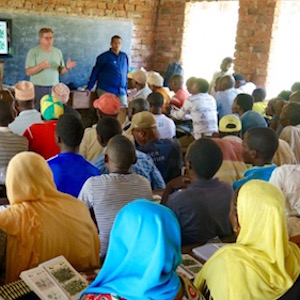
The Gemological Institute of America (GIA) is expanding its gem guide for artisanal miners to other African communities after a successful pilot in Tanzania.
At the International Colored Gemstone Association Congress in Bangkok on Oct. 15, GIA president and chief executive officer Susan Jacques announced a four-year, $1.3 million commitment to expand the program to Madagascar, Nigeria, Rwanda, and Zambia. The program aims to reach 10,000 miners with relevant information on how to evaluate the quality of the rough they mine. It is run in coordination with Pact, a Washington, D.C.–based development nonprofit organization with expertise in the region.
The gem guide project began shortly after GIA distinguished research fellow Dr. James Shigley saw the difficult working conditions of artisanal miners during a 2008 trip to Kenya and Tanzania. The resulting booklet—Selecting Gem Rough: A Guide for Artisanal Miners—has images of the gemstones found in East Africa and illustrations of how to examine and evaluate rough gems. The book is waterproof and comes with a durable plastic tray that can be used to sort gems and do basic gemological evaluations.
“We found that for every dollar invested, there was a 12-fold social return that will last years into the future,” said Cristina M. Villegas, technical program manager for Pact’s Mines to Markets program, in a statement. “With their new knowledge, miners improve their income, send their children to school, invest in their mines and their communities.”
GIA staff, including Robert Weldon, current director of the Richard T. Liddicoat Gemological Library and Information Center at GIA, trained more than 1,000 artisanal miners on how to use the guide and tray during a two-week period earlier this year in Tanzania.
“There is nothing more rewarding than seeing the reaction of the miners as they learn the material,” said Weldon in a statement. “You instantly see that you’ve positively made a change in someone’s life.”
Top: GIA staffers training miners in Tanzania (image courtesy of Gemological Institute of America)
- Subscribe to the JCK News Daily
- Subscribe to the JCK Special Report
- Follow JCK on Instagram: @jckmagazine
- Follow JCK on X: @jckmagazine
- Follow JCK on Facebook: @jckmagazine